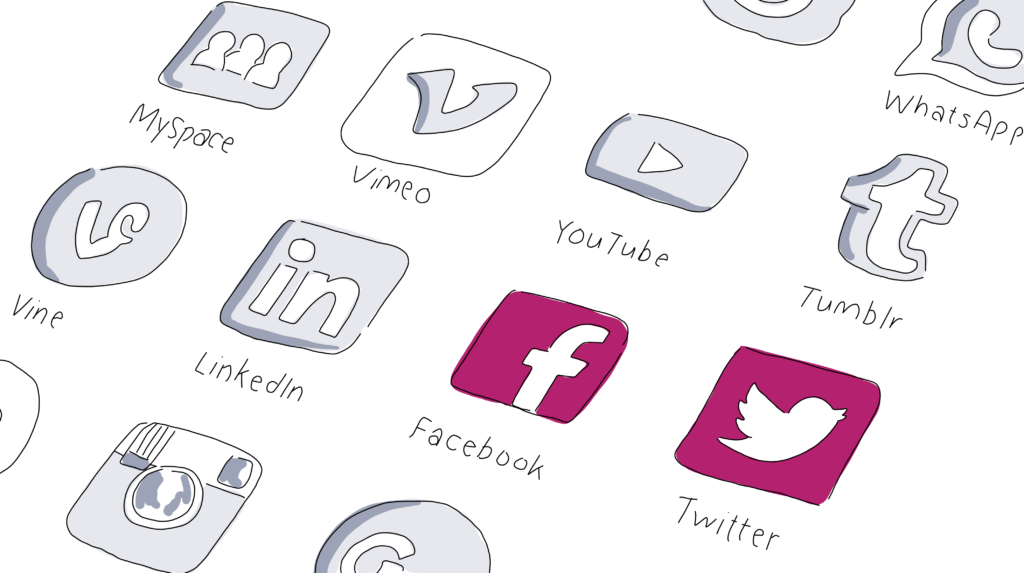
10 Common Mistakes in a Hotel Social Media Strategy
Social media can be a powerful tool in promoting your hotel and building your brand’s online presence. With a clever hotel social media strategy, you can drive engagement with potential guests, boost your bookings, and increase your brand loyalty for future visits.
Unfortunately, many hoteliers either don’t know where to begin when it comes to their social media, or they end up making rookie mistakes that can sometimes cost them their reputation and lose potential clientele.
Are you making any of these common mistakes in your hotel social media strategy?
10 Common Hotel Social Media Mistakes
[Tweet "Hotel social media empowers you to drive engagement with potential guests."]

#1: Not Being Active
Many hotels set up their social media pages, and then fail to do much more than that. Don’t let your hotel social media accounts become zombies. Social media platforms are driven by constant real-time updates. They’re exciting. They’re full of life.
You should be logging on to your social media accounts a few times each day to keep things alive and monitor activity. Be present on your pages and always interact with your followers through messages and comments.
However, just because you’re logged on every day, does NOT mean you need to post every day. Avoid posting too often or simply posting just for the sake of it. Always have something interesting to share with your followers. About three to five posts per week is a happy medium. Can’t log on even just a few times a week to post? Automate half of your posts (we love tools like Buffer and Hootsuite), and then post the others live.
The Beverly Hills Hotel is already famous on its own, having been the haunt of many celebrities and well-known political figures since Hollywood’s golden age. But that doesn’t mean they slack when it comes to being active on social media! The brand’s Twitter account regularly posts photos of the latest building upgrades, shots of their bartender’s latest genius creation, and even recipes of their restaurant’s most popular dishes.
What’s at Stake: 77% of businesses in the U.S. use social media to find customers and generate sales. So not being active online is like throwing money away.
#2: Not Responding
Social media is exactly that “ SOCIAL! Unlike traditional advertising, social media allows for more than just a one-way conversation and gives your followers the chance to actively engage with your brand.
So, how do you drive engagement on social media? You engage! Invite your followers (who might be potential hotel guests) to interact with your posts, and be sure to consistently respond back. If you receive negative feedback from a hotel guest on your page, don’t ignore it. And never delete it (unless it contains offensive material, of course).
Be accountable, acknowledge your guest’s complaints and offer a positive solution, just as you would when dealing with a customer face-to-face. Leaving comments unanswered shows you don’t care if a prospective or current customer engages. So treat social media comments like a two-way conversation.
The Urban Cowboy B&B makes sure to always respond or like to every comment they get in their Instagram feed. Fans are rewarded for engaging and the hotel gets that added boost of brand recognition since their name will be in that person’s notifications again. Their rule of thumb for keeping up with all the commenters seems to be the following: every comment that has questions or leaves a thoughtful response gets directly answered and like while strings of emojis and short, two-word praises just get likes.
What’s at Stake: Not answering a comment (especially if it’s a complaint) on social media has been proven to decrease customer advocacy by 50%. Meaning not responding on social media can both harm your customer’s experience and your overall business.
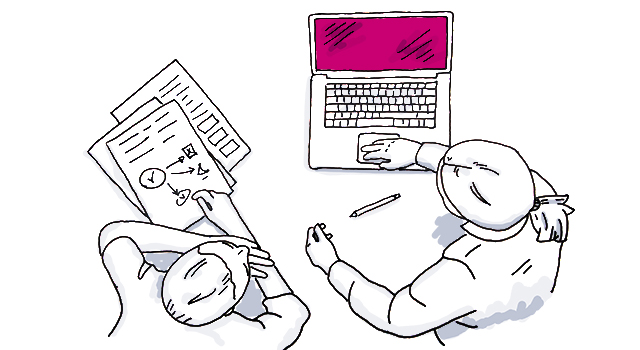
#3: Lacking Creativity and Beautiful Imagery
Social media is a highly visual medium. And any successful social media strategy will devote a significant amount of time to the creation of well-composed, high-quality graphics and images. Consumers’ attention is captured by beautiful imagery, so be selective when posting images of your hotel. When your potential guests are casually scrolling through Facebook, Instagram, and Pinterest for hotel inspiration, you want your photos to have the impact and the beauty to stop them in their tracks.
Consumers are bombarded with non-stop posts and photos in their social media feeds every day. This calls for less generic, more authentic content. Make your posts count: give them a unique angle specific to your hotel. Be creative, and avoid lengthy and mundane posts at all costs. If you can say it with an image, even better!
Monitor which images and posts receive the most engagement from your followers, and use this information to shape your future content plan.
The Shangri-La Maldives knows that their iconic hut lodging and the beautiful ocean scene that surrounds them are their top selling point. Which is why they aim to create inventive and interesting images that portray the classic tropical vacation scenes in addition to some out-of-the-box shots that show how truly unique their hotel is. Even if your hotel is not located on the water, there is still plenty to learn from the brand’s Instagram feed.
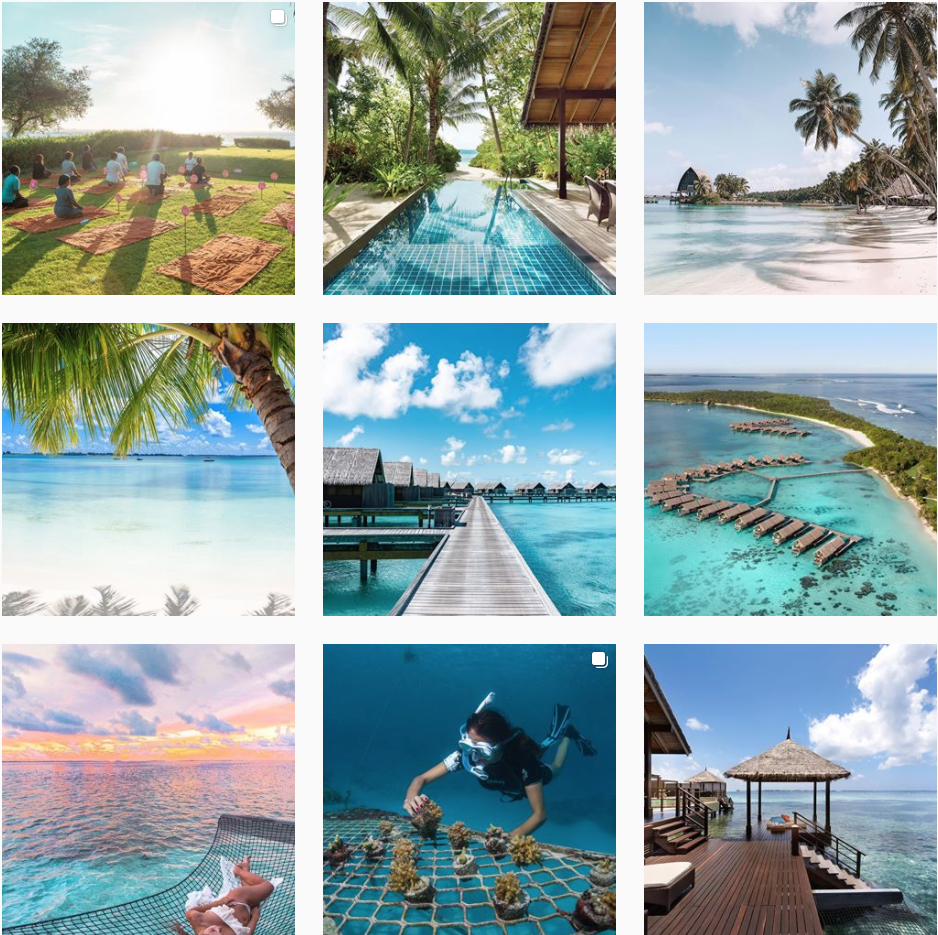
[Tweet "Consumers’ attention is captured by beautiful imagery. Be selective with which images you post."]
What’s at Stake: According to social media statistics, 73% of social media video consumers want to see content that isn’t boring. Yikes! Win over your fans by standing out from the crowd with content that is actually high quality.
#4: Incorrect Spelling, Grammar, or Errors
People on social media can be like vultures when it comes to spelling or grammatical mistakes. Of course, an occasional typo is no big deal, but consistent errors or unfinished posts look totally unprofessional, careless, and will send your hotel’s credibility straight out the window.
Don’t let flawed content slip through the cracks. Check, double-check, and triple-check your social media posts before they go live. Or, use browser extensions to help catch grammatical errors before your social posts go live. One of our favorite tools is Grammarly, which can catch grammatical errors and make suggestions on how to fix them.
The Celtic Manor Resort has a pristine image of class and sophistication, which is probably why their Facebook page is thriving. It only makes sense that such a polished brand would strive to post high-quality updates that have been edited for both content and common mistakes.
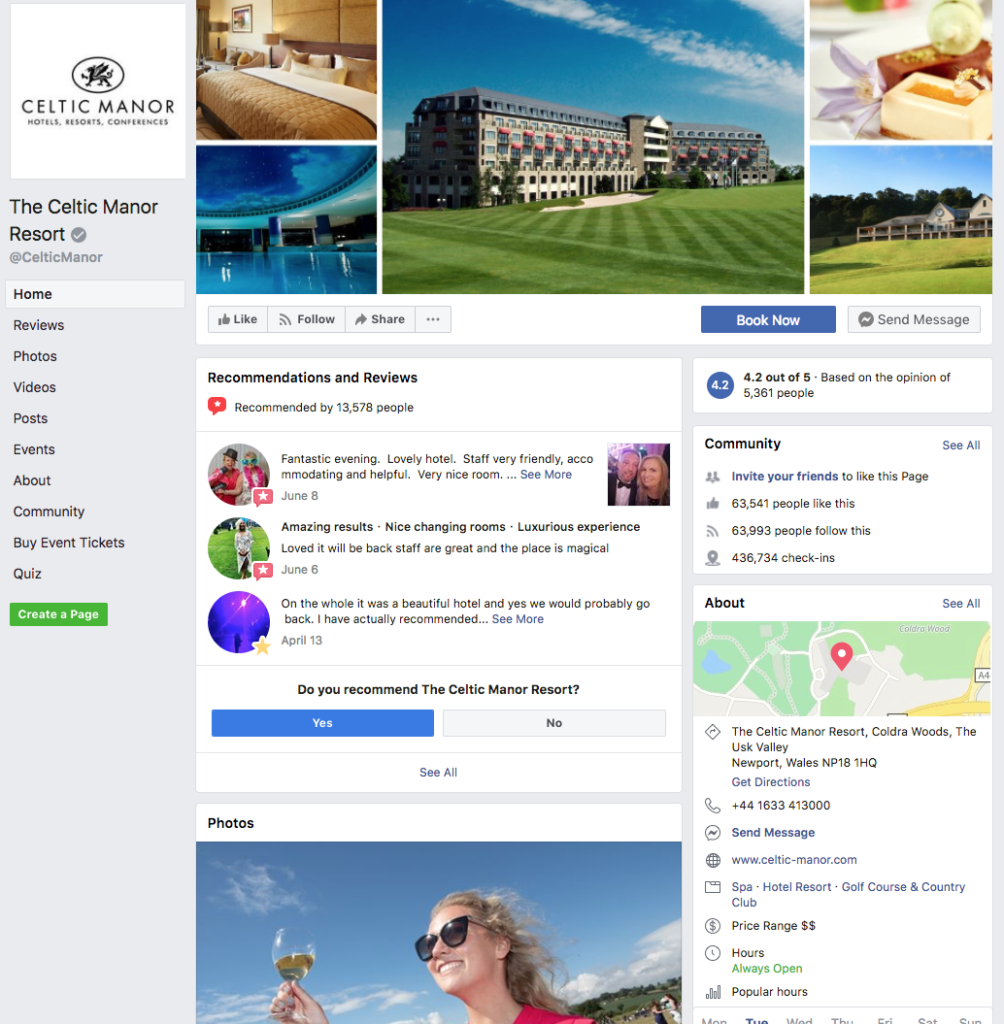
What’s at Stake: 74% of survey respondents between the ages of 18 and 34 are actively irked by grammar mistakes made on branded social media posts. Don’t be the hotel that pisses people off - it only takes a couple of minutes to edit your posts before they go live.
#5: No Call to Action
So, you’ve got a killer hotel social media strategy. You’ve engaged potential guests with your witty and interesting content. They’re interacting with your posts on Facebook and liking all of your beautiful Instagram photos. You’re keeping your hotel’s brand top-of-mind.
But, when it’s time for your followers to take a vacation, how do you convert their positive engagement into a booking?
The answer is to make it as simple and easy for them as possible. Give your guests a clear and direct online path-to-purchase that requires minimal time, effort, and searching on their behalf. Facebook and Instagram both offer call to action buttons so you can ensure your potential guests are only one click away from booking.
Hotel Miro knows the power of a good CTA - which is why they allow their audience to directly book their stay from the brand’s Facebook page. They also make sure to write out calls to action on their photo posts as well. With one clear goal in mind (booking rooms) virtually all of the page’s CTAs work together to funnel clients into their scheduling system.
What’s at Stake: Expert social media analysts have found that posts with CTAs get 50-75% more engagement than posts without them. So if you’re not using CTAs, you’re missing out on the true PR power of social media.
#6: Having Incomplete Profiles
Who cares how beautiful your feed looks if your profile looks sketchy? Gaining trust online means having a complete profile with clear photos, detailed text, and all applicable information filled out.
This is especially true for hotels that have a name similar to a competitor or chains that have multiple properties with the same name. How is your audience supposed to differentiate between them all if the information needed is missing?
Plus, Instagram and Facebook now have lots of bonus ways to define your profile, including things like adding link trees on mobile view and saving Stories long term on your profile. All of these features combine to form a more complete vision of your brand.
Plus, you never know which one your newest fan might be interested in checking out. If they go to your page looking for a direct link to your website, there’s a good chance they might never bother searching for it if it’s not immediately available.
For example, El Fenn Hotel Marrakech’s Instagram has fully realized its potential. In addition to including a detailed bio, clear profile picture, and link to their website, they also have a reliable amount of Stories for fans to check in with. They save certain about events, their swimming pool and spa, as well as the local places where they love to shop, dine, and do some sightseeing. Anyone who stops by their account has a lot to learn from their recommendations and aspirational content.
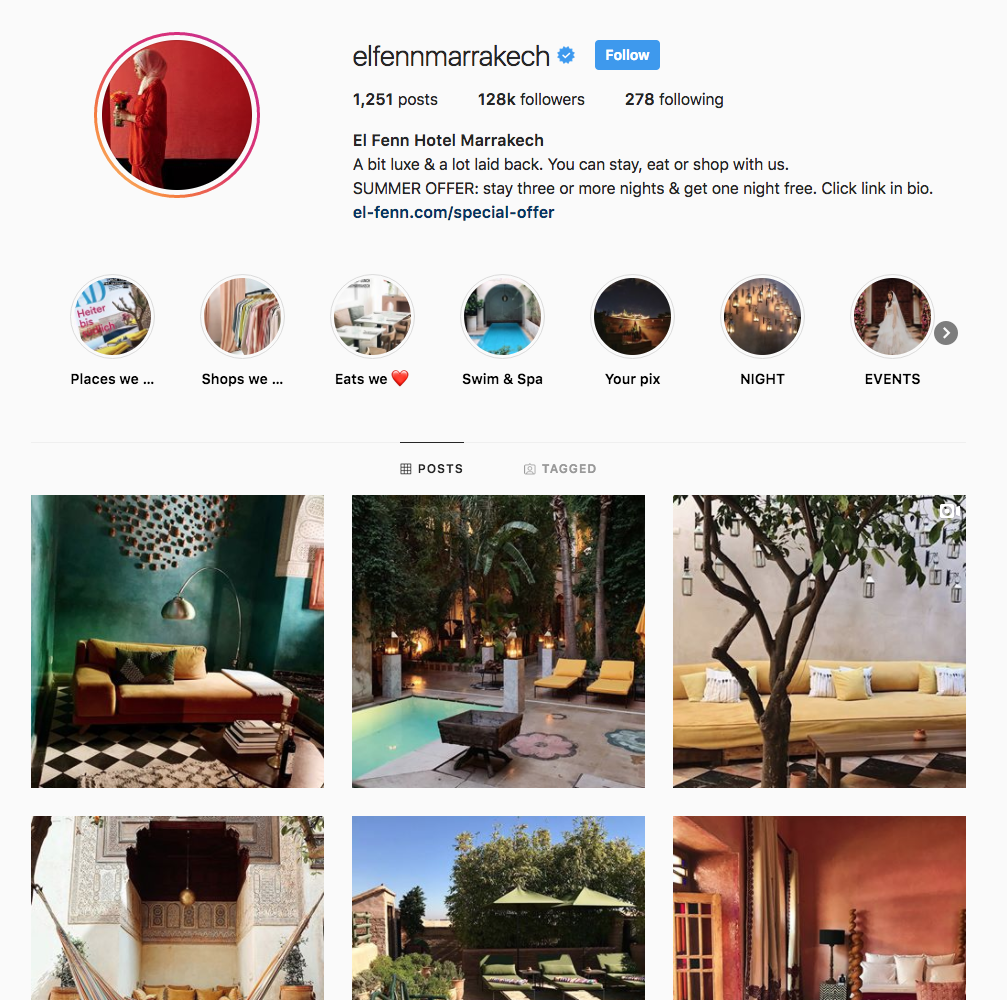
What’s at Stake: Around half of all Millennials and Generation Z (42% and 50% respectively) consider social media to the best way to consume advertisements, which is why missing out on a fully realized profile could harm your hotel brand. See your page through the eyes of people who actually want to be advertised to here - does your profile really provide everything it possibly can?
#7: Forgetting to Update Your Info
No one likes seeing information on a website that’s different from a Facebook page, that’s different from a Twitter account, that’s also different from an Instagram post.
And if you have multiple people working on your social media, there’s a good chance these details can slip through the cracks. However, hotels need to be diligent about updating information across every online presence.
Things like direct booking page links and contact information need to be handled as soon as the changes are made. You also need to make sure all special offers and discount packages are presented across all channels with the utmost accuracy. Customers who view a post on your Facebook page about a spa day deal that, according to your website, is now sold out, are going to be very disappointed when they find out it’s no longer available.
No matter whether its high season or low, you can rely on the minimalist Casa Camper to always have reliable and accurate information for guests and fans. Despite having two international locations (one in Spain, the other in Germany), the lines of communication are always clear. If you go to their website or any of their social media pages, you’ll find uniform content that makes it easy to understand what makes these two interesting locations so great.
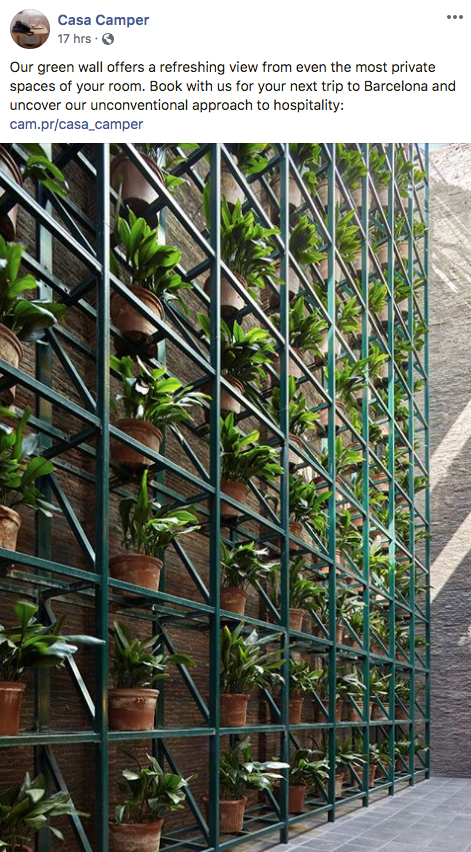
What’s at Stake: Having outdated or inaccurate information on your social media pages is one of the 8 signs you’re behind the times on social media. But there’s really no reason to be, especially since having updated info is crucial to ensuring your customers have a great experience of your brand online.
#8: Not Using Video Content
It should come as no surprise to the modern marketer that video marketing is important for hotels. Over 100 million people watch videos on social media platforms every day. And of the total amount of viewers per post, you can expect 80% of your audience to prefer watching a video to reading text.
So really, all you have to do is give the people what they want! Thanks to features like live streaming, Stories, and GIFs, boosting the entertainment portion of your hotel social media pages will do wonders for engagement and audience building. Some platforms even provide incentives for businesses who use certain features.
For example, profiles that shoot and save live videos on Instagram will appear before other profiles who only posted Stories at the very top of your menu when you open the app.
The Ned London might just be the hotel industry’s reigning champion of video marketing content that audiences on social media absolutely love. Their Instagram page alone features IGTV videos, the occasional Stories video and livestream, as well as a handful of vids posted on their feed. It’s exciting content that gives audiences something better to do than just speed scroll past their 10th hotel room pic of the day.
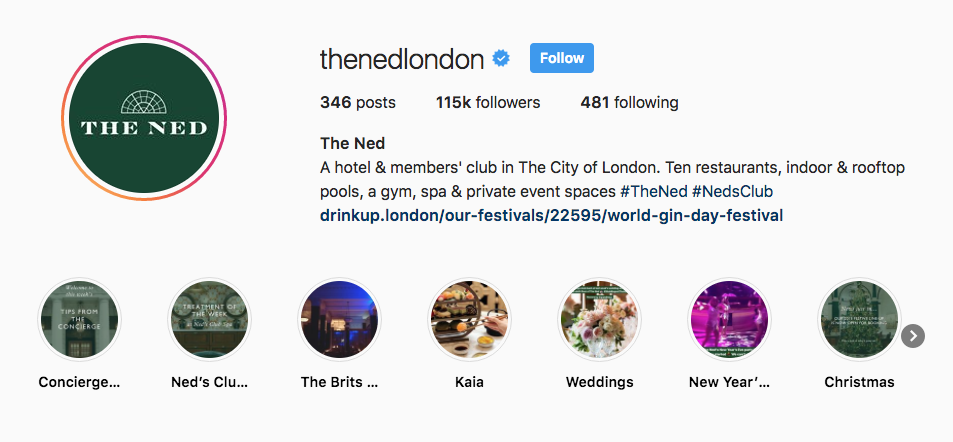
What’s at Stake: Consumers love seeing videos on social media, so make sure your strategy includes this vital component of user engagement success.
#9: Overpromoting
No matter how much your audience loves your content, they can easily get burnt out from constant posts that ask them to book a room.
In fact, research conducted by the Content Marketing Institute shows that 90% of the most successful marketers prioritize audience education over sales messages and that 56% of those who had feeds entirely made up of promotion posts stated that their social media efforts were unsuccessful.
And while you should include call to action (like we mentioned above) on relevant posts, concentrate on making content that adds value to the community. Things like news on local events, beauty tips from your onsite spa, and travel advice are all welcome additions to your audiences’ feeds.
While the Roger Smith Hotel does Tweet about their lovely room renovations and special offers, they spend most of their time sharing things like on brand quotes, spotlights on interesting people and events (mostly writers, since that’s what they’re known for), and recommendations for art enthusiasts visiting the city.
What’s at Stake: Social media marketing statistics prove that these channels are also a crucial customer care outlet for addressing both praises and concerns. So listen to your customers, share content they will actually enjoy, and share the occasional self promotion piece and your engagement should take off.
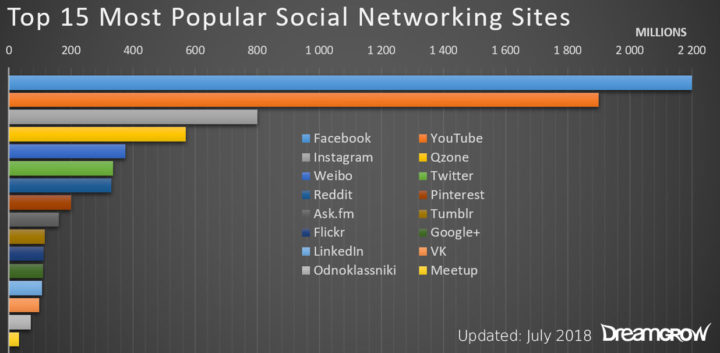
#10: Limiting Your Social Media Presence
Do you only have an Instagram? Or maybe you have a Facebook that you’ve slowly been building too. While these steps are good and necessary, hotels can’t afford to limit themselves to one or two corners of the internet. As difficult as it is to keep up with each platform’s trends and algorithm changes, you’ve got to prioritize having some sort of presence across all channels.
Given that most hotel audiences are diverse and your business relies so heavily on getting new people in the door as often as possible, it makes sense why you can’t risk missing out on these valuable opportunities to get discovered by potential guests.
W Hotels Worldwide have complete and up-to-date accounts on Facebook, Twitter, Instagram, as well as a fully fleshed out website, blog, and even Tumblr. They also make sure to use every available feature on each platform. Making the most of their social media presence is a smart move that helps them interact with and build loyal fans over time.
What’s at Stake: Business.com says that, regardless of your industry, every company should be using multiple social media accounts. If you don’t, you’re at-risk of losing SEO opportunities, large chunks of your potential audience interactions, and a lot of chances to provide the best possible customer service.
Get your hotel social media strategy back on the right track by avoiding these common mistakes, and help your brand start to shine online!
Have you committed these hotel social media strategy mistakes? Share how you bounced back on Twitter!


